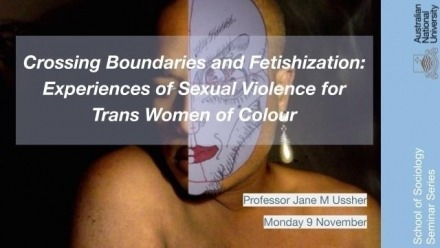Crossing Boundaries and Fetishization: Experiences of Sexual Violence for Trans Women of Colour

Abstract:
Transgender (trans) women are at higher risk of sexual violence than cisgender women, with trans women of colour reported to be at highest risk. This presentation discusses a recent ANROWS funded study Crossing the Line, which examined subjective experiences of gender affirmation and sexual violence for 31 trans women of colour living in Australia, through in-depth interviews and photovoice. The study also compared the sexual experiences of trans and cisgender women through a national survey and examined online forum data.
Gender affirmation was described as a complex process with positive consequences for health and wellbeing, and negative consequences in terms of transphobic sexual and physical violence. Passing as a woman resulted in social acceptance and reduced the risk of transphobic violence, but increased the risk of misogynist abuse. Our interview, online forum and survey data, as well as our literature review, demonstrated that sexual violence is a common experience for transwomen. Sexual harassment that served to “cross people boundaries”, included transwomen being objectified and positioned as other, being stared at, misgendered or having their gender publically commented upon in the public domain. This often resulted in women being hypersexualised, outed as trans, or as a man, which could lead to social exclusion, or a situation of danger for the woman. Physical and sexual assault which served to “cross bodily boundaries”, included women being beaten up, spat upon, groped, online violence and forced sex or rape, in the public domain. There were also accounts of violence and sexual assault in the context of the family when women were younger; when dating new partners, where fetishisation can also occur; and within intimate relationships.
The poor health outcomes experienced by many trans women are closely associated with their exposure to sexual violence and the social inequities and transphobia they are subjected to. Trans women of colour may experience additional prejudice and discrimination due to the intersection of gender, sexuality, race and social class. Our research suggests that understanding these intersectionalities is integral in understanding the sexual violence experiences of trans women of colour.
About the Presenter:
Jane M Ussher is Professor of Women’s Health Psychology, in the Translational Health Research Institute, at Western Sydney University. Her research and scholarship focuses on sexual and reproductive embodiment, women’s madness, and the gendered experience of cancer and cancer care. As a trained clinical psychologist, she has also made a contribution to the integration of research and clinical practice in gendered health. She is author of over 250 papers and chapters, and 13 books including Fantasies of Femininity: Reframing the Boundaries of Sex (Penguin), Managing the Monstrous Feminine: regulating the Reproductive Body (Routledge), The Madness of Women: Myth and Experience (Routledge) and The Routledge International Handbook of Women’s Sexual Health (2019), edited with Janette Perz and Joan Chrisler. Jane is also editor of the Routledge Women and Psychology book series, and President of the Australian Society for Psychosocial Obstetrics and Gynaecology (2017-2021), President of the Society for Menstrual Cycle Research (2019-2021), and Fellow of the British Psychological Society. Her current funded projects include an ARC Linkage project on LGBTQI+ experiences of cancer; an ANROWS funded project on sexual violence and transgender women; and research on the sexual health of migrant and refugee women.






